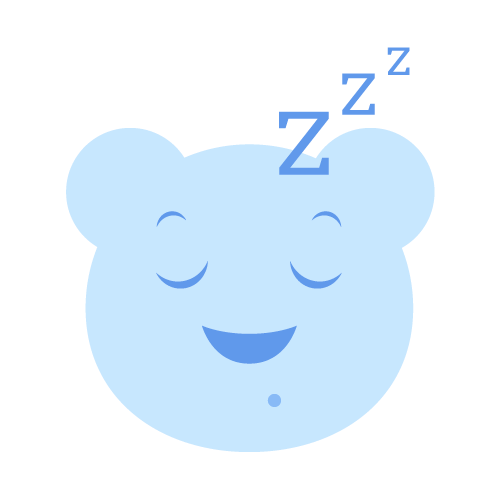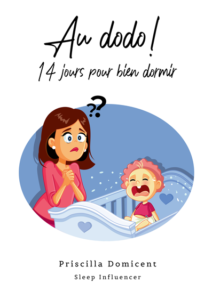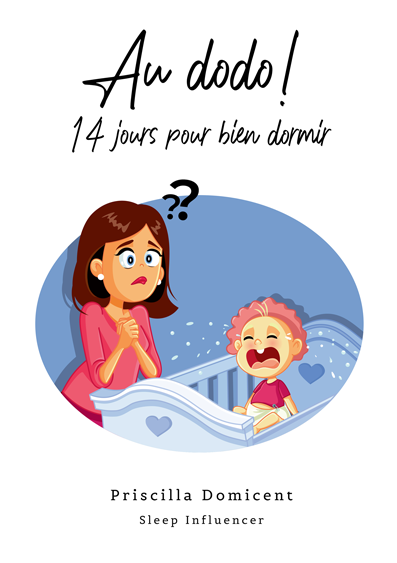Dodo Coaching,
the Best Sleep Guarantee
for the Whole Family
As a Sleep Expert for babies and children, I offer guidance to help your family
get a good night’s sleep in only 14 days.
As a Sleep Expert for babies and children, I offer guidance to help your family
get a good night’s sleep in only 14 days.
of sleep are lost by new parents in their baby’s first year
are enough to teach a child to sleep without Mom or Dad
of parents confirm sleeping through the night again after less than 2 weeks of sleep coaching
followers read Dodo Coaching’s Facebook updates
Behavioral sleep issues occur frequently, affecting approximately 25% of children. What type of sleeper is your little one?


We all have our little tricks to put Baby to sleep. These are often developed over time after trials and errors. Inspiration sometimes comes instinctively. One of the most famous sleep-inducing techniques is the swaying in Mommy’s or Daddy’s arms. Some alternatives are as effective such as the stroller, the baby carrier or the car. Babies love to be rocked because the rhythmic movements recreate the in-utero sensations. Motionless sleep can be unbearable for some.
Replicating a gentle, repetitive and regular rocking movement can be challenging, especially in the middle of the night. Tiredness and frustration can destabilize the parent who reproduces ill-controlled movements or feels the need to take breaks. Since Baby is used to regular movements and is very receptive to body language, it becomes overwhelmingly difficult to calm him down. Motion techniques sometimes only result in small victories of very short duration. As soon as Baby is being laid down in bed, he usually wakes up immediately to request another little ride.

 Relying on nursing or bottle-feeding
Relying on nursing or bottle-feedingNursing or bottle-feeding to fall asleep is by far the most common pattern seen with newborns and infants. It is natural and understandable. The infant finds himself in sleeping conditions he recognizes. Everything reminds him of the in-utero environment: the promiscuity thanks to the parent’s arms around him, reassuring voices and the sweet feeling of satiety.
Your child is not always crying in the middle of the night because he is hungry. If he is nursing or bottle-feeding for comfort, nighttime awakenings can become difficult to manage. Your little one does not know how to get back to sleep without your intervention. To teach him how to become an independent sleeper from early infancy, it is important to disassociate sleep from nutrition.

 Cry it out
Cry it outOn average, infants tend to cry for around two hours a day. But crying does not have the same meaning for babies as for adults. This is not a pathological behavior; their survival depends on it. At this early stage, they use preverbal communication. They cry in different ways to tell us when they are hungry, bored, in pain, in need of attention or overstimulated. Newborns and young infants do not cry to manipulate their parents or to be capricious. You can’t spoil your baby by being too responsive.
You may have noticed that as the day goes on, your child becomes more agitated and difficult to console. When Baby cries when you put him to bed and shows resistance, he needs your time and energy to help him wind down. When facing such situations, parents can use positive sleep techniques to comfort their child, helping him to self-soothe while staying by his side. Several scientific studies have demonstrated that children who, during the first nine months of their life, were quickly consoled are more independent and confident than those who have been left alone to cry it out. This bounding, which experts also call attachment and security, is the glue that unites the family and serves the children in their relationship to others.

 Frequent awakenings
Frequent awakeningsNocturnal awakenings are frequent (every 50 to 90 minutes) and normal for children. The problem occurs when they do not know how to go back to sleep following a partial arousal. They cry, call their parents or get up every time their eyes pop open.
Multiple reasons explain the frequency of night awakenings. For instance, they can be caused by sleep deprivation, physical pain, hunger, nightmares, night terrors, fear of monsters or separation anxiety.
It could also be that they have not yet learned to put themselves to sleep. From birth, babies feel confused during partial arousals. They wonder why they are alone in bed, or how to go back to sleep. Then they cry and parents tend to rush in to rescue them from their tears. To decrease the level of intervention, it is possible to create positive sleep associations. These will provide the comfort and security needed to self-soothe and fall back asleep alone, quickly and peacefully.

 Early birds
Early birdsDoes your child wake up regularly before 6:00 a.m. and is ready to start his day? If so, there is no reason to panic. Soon you will wake up at a reasonable time.
Some parents consider themselves to be small sleepers and think their child enjoys the same genetic advantage. Even if your child does not seem to need much sleep, all children, without exception, must benefit from enough qualitative sleep. Sleep is essential for their brain development, regulates hormonal production (e.g. growth and appetite) and facilitates memory consolidation. Finally, it protects the little ones by creating a better immune response. Sleep impacts their daily health.
Most of us have heard the adage “Rise and shine! The early bird gets the worm”, but this is not a reason to let your well-being deteriorate due to lack of sleep. There are ways to push back the morning wake-up time. The faster you will act upon early risings, the easier it will be to change the pattern. A healthy and well-rested child should normally get up between 6:00 a.m. and 7:30 a.m.
If you experience awakenings before dawn too often, I have good news for you! There are solutions to overcome this problem. Eight reasons can explain why your child wakes up painfully early. Once we identified the root cause, we can solve the sleep problem by applying the appropriate solution. Smile, you will soon start your days off on the right foot again!

As a Sleep Expert I first and foremost act as your trusted partner. Together, we can work towards your goals. During the first consultation, I tune in with all my attention to understand your current situation, your needs, and your expectations. I attach great importance to active and non-judgmental listening.

Your child, with his temperament, strengths, and limitations, is a unique little creature. Since no two cases are alike, it may be difficult to identify the causes of his sleep problems. Thanks to our conversations, you will have the opportunity to ask questions about your child’s sleep. Together, we will identify the reasons causing restless sleep and find ways to fix it.

As there is no standardized approach to help your child fall into the arms of Morpheus, we will develop together a customized Sleep Project. It describes in detail the combination of solutions tailored to your child and your parenting style. They will be based on principles resulting from scientific research, recommendations from renown pediatric institutions and my past experiences.

Letting your child cry it out can be heartbreaking. To avoid feeling stressed, anxious or defeated, I developed the Dodo Coaching sleep-training method. It is a direct application of positive learning principles. We will solve the sleep troubles without creating deep frustrations for you nor your child. The learning process consists of a series of steps, all designed to teach your kid to self-soothe and gently fall asleep without your assistance.


I was looking to get some help since I was going back to work. I had no idea how to get my twins to sleep through the night and the bedtime routine was lasting forever. To make things even more complicated, the twins were going to be moved into the same room as their 4-year old brother. I decided to contact Priscilla and was convinced after our short call that my family was going to be in good hands. It felt so great to have a guide and to just have to follow her advice. I highly recommend her sleep coaching method. It is gentle and is adapted to the needs of each child and to the parents’ requests. Our whole family is now well rested!

One morning I woke to realize that somewhere along the way, I inadvertently became a co-sleeper with my son, Mac. It was not my plan, just a stop-gap to help us both sleep thru the night. I feared that I had strayed too far down the co-sleeping path and that my fate was sealed. Luckily, I found Priscilla. Her advice is straight-forward and easy to follow with every step in the program tailored to our family. With Priscilla’s help, Mac has returned to sleeping in his crib since our first night of training. The plan requires some perseverance, but Priscilla is there to support my family every step of the way.

Our little boy has always been a terrible sleeper. He was 3 years old when we decided that we could not go any further like this. I had’t slept for 8 straight hours since he was born. We got rid of the crib when he was about 21 months because he was climbing out of his bed. I was so scared that he would fall and hurt himself that we transitioned him into a toddler bed. After the change, he would come 2 to 3 times a night in our bedroom. It would always take us forever to bring him back to his own bed. Thanks to Priscilla’s advice and recommended routine, we have managed to keep Lucas in his room all night long and do not experience any early wake-up calls anymore. My husband and I feel well rested again.


We dream about appreciating every moment of parenting. Especially in the first months of your baby’s life should be remembered as great moments. However, exhaustion can sometimes interfere with our ability to express and experience joy. That’s what happened to me. While living in Manhattan with our first daughter born prematurely, my husband and I went through a long period of chaotic nights. I felt drained, developed chronic fatigue and looked like a zombie.
After 5 months of mental wandering and physical tiredness, I desperately wanted to find my energy back and bond more with my baby. So, I looked for solutions.
My friends? They did not have children. I was the first in my group to go through this life stage.
My family? Everyone lived on the other side of the Atlantic Ocean. As much as they wanted to help out, distance made it impossible for us to get the needed support and their much-needed presence.
Google? Whose advice should I follow? How do doctors or bloggers know what is best for my daughter?
I have always been passionate about the mystical world of sleep and dreams (it’s not surprising that, in my childhood, my nickname in the Scouts was “marmot”!). Frustrated in my attempt to find a suitable solution to end my sleep deprivation, I decided to question sleep specialists myself. And, after only 5 days of sleep training, my daughter slept through the night.

When meeting other parents, I quickly realized that sleep was a key topic. At their request, I shared my findings and talked about my experience. Ill-informed parents were challenging me to understand which solutions would suit their child best. To provide truly useful advice to tired parents, I decided to undertake the Gentle Sleep Coach® training in the United States.
Since then, I advise parents around the world to get back in control of their life thanks to uninterrupted sleep. In my opinion, watching my girls sleep peacefully is the best spectacle in the world. This pushes me to help other Moms and Dads put in place an adequate and sustainable sleep hygiene for their child. Everybody deserves a good night’s sleep!

Have a look at the combinations of services that are available. During the first consultation, we can evaluate which package best suits your needs and expectations.



Do you have questions about your child’s sleep? Check out my blog to find tons of reliable information to better understand concepts such as sleep habits or positive sleep association. Discover practical DIY solutions to solve your child’s sleep troubles… and much more.



